Lack of common purpose
The sea and its ecosystem services are a common resource. Unlike privately owned properties on land, for example, they do not belong to individuals but are available to the whole community.
Many of the resources in the sea are finite, fish stocks being one example. If individual nations or companies help themselves to the sea’s resources as they see fit, sooner or later these resources will be exhausted. Today many fish populations are already classified as overfished due to excessive catches over the years. Economists use the term “commons” to talk about publicly available resources (like the fish in the sea) which are freely usable but limited in supply. Originally the concept referred to land areas such as fields or pastures used collectively by the citizens of a community.
The problem with the use of commons has always been that those interested in using this kind of resource find themselves competing with each other. If one company or country makes use of a common resource, less of it is available for the other stakeholders. From a purely economic viewpoint, it is worthwhile for a company or country to exploit these resources to the fullest possible extent in order to secure the maximum possible share and generate profits accordingly.
In past decades this approach has led to ever more serious harm to the marine environment. Unrestrained fishery is one of the uses of the commons that will tend to cause such harm. Likewise, the discharge of pollutants from industry or from municipalities into the sea is an-other example of a use of marine commons that is ulti-mately selfish. Individual companies, municipalities or countries save themselves large expenditures for the disposal of pollutants by making use of coastal waters as a free drainage tank for effluents. For the protection of commons to make sense, on the other hand, many users or states need to cooperate.

